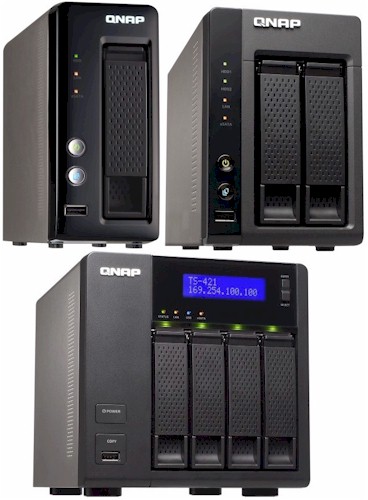
| At a Glance | |
|---|---|
| Product | QNAP TS-x21 Turbo NAS Series [Website] |
| Summary | Marvell-powered Home and SOHO NAS line |
| Pros | • USB 3.0 & eSATA ports • Cloud backup to Amazon S3, ElephantDrive, Symform |
| Cons | • No significant performance advantage vs. TS-x20 family |
Introduction
This is a quick companion review to the TS-x20 family review posted last week. If you’ve read that review, you can probably skip this one, since most of what I’m going to say you’ll already know. But if you’ve arrived here fresh from your favorite search engine seeking the poop on QNAP’s TS-121, TS-221 or TS-421 NASes, read on. There is also a full review of the TS-421 for your edification.
All four members of the TS-x21 series have 2.0 GHz single-core Marvell CPUs with 1 GB of DDR3 RAM and 16 MB of flash. (The fourth family member is a TS-421U four-bay rackmount.)
For the most part, the TS-x21s look similar to their TS-x20 cousins. The differences are that the TS-421 has an LCD status panel and the TS-221 and TS-121 are black instead of white.
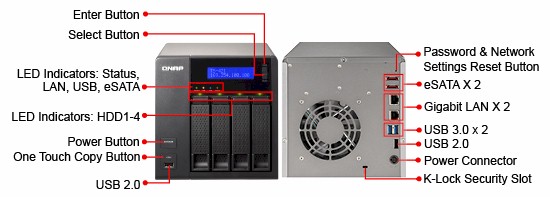
QNAP TS-421 Front and rear panel callouts
The TS-421’s callouts are in the image above and the rear panels of the three models are arranged side-by-side below.
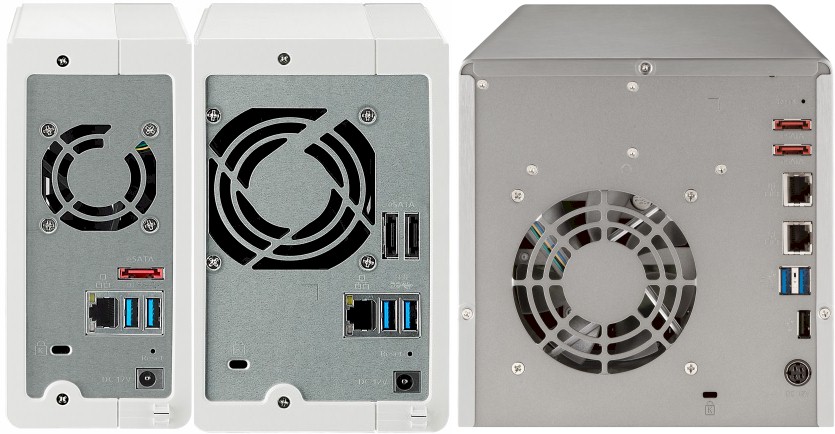
QNAP TS-x20 & x21 series rear panels
A summary of the each model’s ports is in Table 1.
| TS-120 / 121 | TS-220 / 221 | TS-420 / 421 | |
|---|---|---|---|
| USB 2.0 | 1 | 1 | 2 |
| USB 3.0 | 2 | 2 | 2 |
| eSATA | 1 | 2 | 2 |
| Ethernet | 1 | 1 | 2 |
Table 1: Port summary
Inside
The partial view of the TS-421’s main board below didn’t allow positive identification of the Marvell SoC. But we know it has a 2.0 GHz Marvell 88F6282 Kirkwood SoC substituted for the 1.6 GHz version used in the x20 models and 1 GB of onboard DDR3 RAM vs. the 512 MB in the x20s.
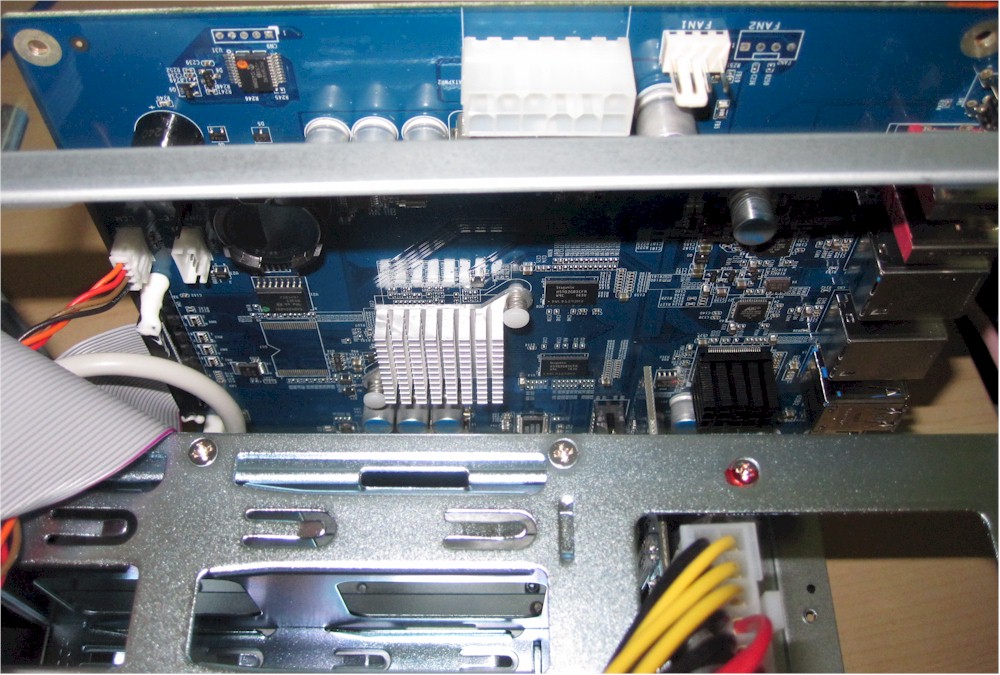
Partial view of QNAP TS-421 / TS-420 board
Both the TS-420 and TS-421’s CPUs have a heatsink. Table 2 summarizes key components for the TS-420, TS-421 and older TS-412.
| TS-421 | TS-420 | TS-412 | |
|---|---|---|---|
| CPU | Marvell 88F6282 Kirkwood SoC @ 2 GHz | Marvell 88F6282 Kirkwood SoC @ 1.6 GHz | Marvell 88F6281 Kirkwood SoC @ 1.2 GHz |
| RAM | 1 GB DDR3 | 512 MB DDR3 | 256 MB DDR2 |
| Flash | 16 MB | 16 MB | 16 MB |
| Ethernet | Marvell Alaska 88E1318 (x2) | Marvell Alaska 88E1318 (x2) | Marvell Alaska 88E1116R (x2) |
| USB 3.0 | Etron Tech EJ168A | Etron Tech EJ168A | N/A |
| SATA | Marvell 88SX7042 | Marvell 88SX7042 | Marvell 88SX7042 |
Table 2: Key component summary and comparison
The NAS was equipped for testing with our standard four Western Digital Red 3TB drives (WD30EFRX). Power consumption measured 27 W with the 4 drives spun up and 13 W with them spun down. Fan and drive noise could be classified as low, i.e. barely audible in my quiet home office.
Features
See the TS-421 review and Craig’s in-depth look at QTS 4.0.
Performance – Summaries
4.0.1 firmware was loaded on a TS-421 for our standard NAS test process. Given that all three models use the same processor, RAM and Ethernet components, all testing was done on the TS-421 sample. The TS-421 tests used four drives configured in single RAID 0, 5 and 10 volumes. The TS-221 tests used two drives in single RAID 0 and 1 volumes. The TS-121 tests used one drive.
As noted in the TS-421 review, times to completely build and resync 4 x 3 TB RAID 5 and 10 volumes were quite long at 17h 20m and 22h 30m, respectively. Unlike Thecus and Synology, QNAP does not offer the option to skip a bad block test, which can speed volume resync times significantly.
Since we have the NAS Ranker, I’ll only make a few observations about each benchmark summary. The TS-421’s Benchmark Summary below shows Windows File Copy write performance about the same (~44 MB/s) for RAID 0 and 10, but dropping to 36 MB/s for the more CPU-intensive RAID 5. File Copy read takes a different tack, with a slight upward trend from RAID 0 through RAID 10 (66, 72 and 73 MB/s).
NASPT File copy results are lower than their Windows File Copy counterparts across the board for both write and read.
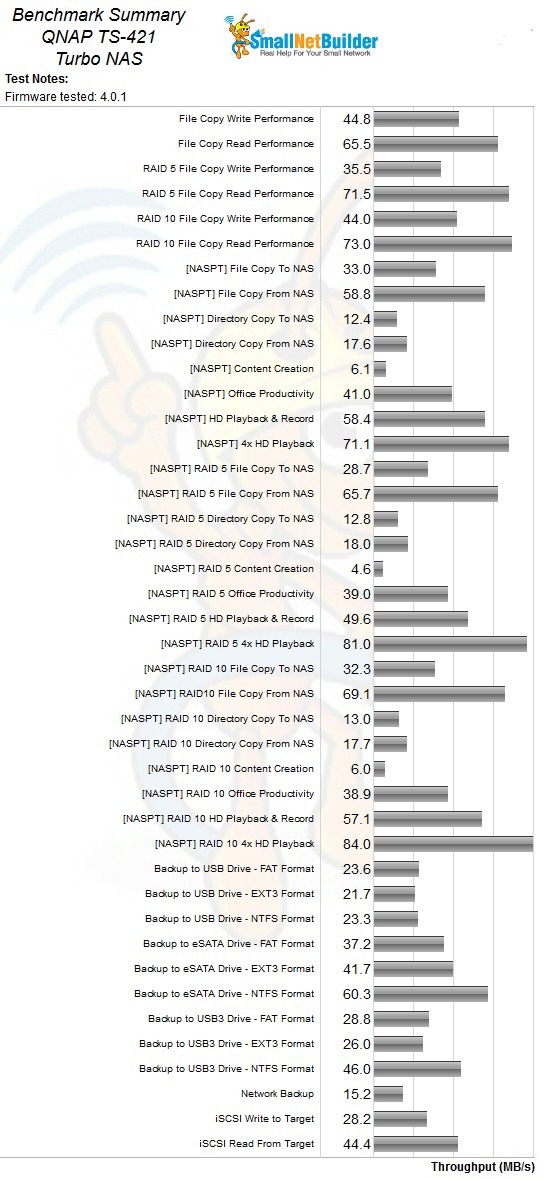
QNAP TS-421 Benchmark Summary
Please note that I copied the Network Backup (rsync) results from the TS-421 to the TS-221 and TS-121 for NAS Ranker consistency. There rsync bug found in the original TS-421 review that required hand-editing of the rsync.conf file had not been fixed as of the retest.
With two drives representing the TS-221’s performance, RAID 0 performance is slightly higher than with four drives. Windows file copy for RAID 1 measured 50 MB/s for write and 78 MB/s for read. NASPT file copy was also a bit higher (38 vs. 33 MB/s) for write and almost 15 MB/s higher for read.
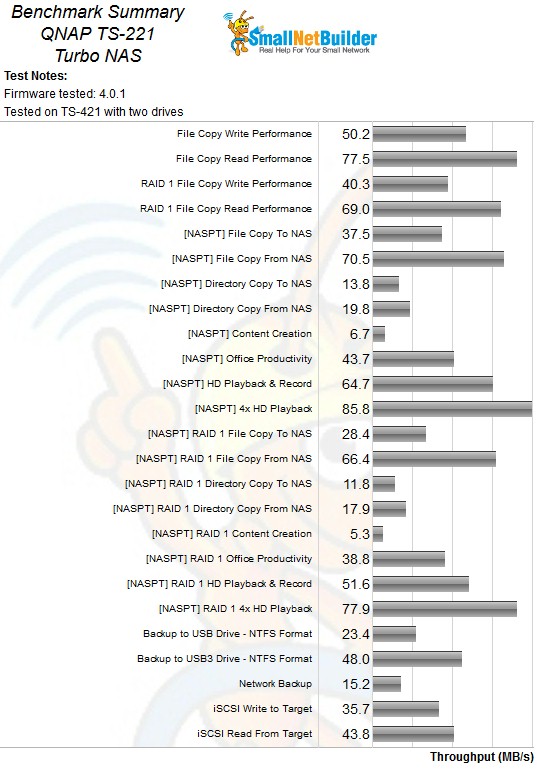
QNAP TS-221 Benchmark Summary
With only a single drive, both write and read performance dipped to 46 and 71 MB/s for Windows file copy and 33 MB/s and 68 MB/s for NASPT file copy.
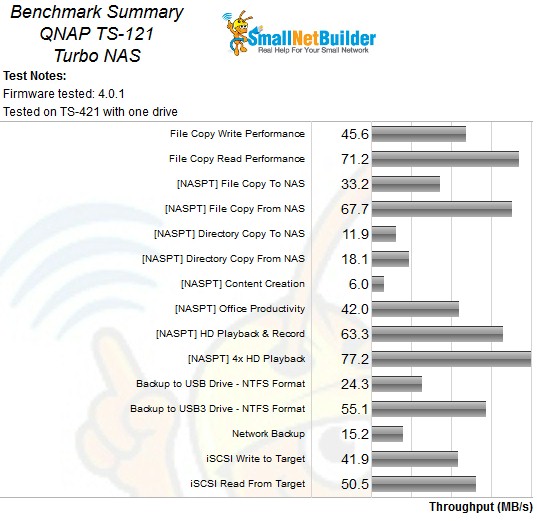
QNAP TS-121 Benchmark Summary
Performance – Ranking
Since the ranker groups products only by processor class, we need to scan the SoC-1 (single core application-specific processors) class rankings to find the relative ranking for products with the same number of bays. For four-bay RAID 5 products, we find the TS-421 in the #11 slot (tied with the TS-121). The TS-420 ranks at #4, with Synology’s DS413j as the only other four-bay NAS between them.
Put another way, the TS-421 is in the #3 slot for four-bay SoC-1 class NASes and the TS-420 is ranked #1. So why? Comparing the Ranker Performance summaries, the standout differences between the 421 and 420 are Windows FileCopy write (45 vs. 53 MB/s), Windows FileCopy Read (65 vs. 79 MB/s), NASPT FileCopy Read (59 vs. 75 MB/s), Video Playback (71 vs. 95 MB/s) and USB 3 – NTFS backup (46 vs. 28 MB/s). In the 421’s favor, it slightly outperforms the 420 on many of the other benchmarks. But when the performance goes the other way, it goes big, pushing the 421 down in the ranking.
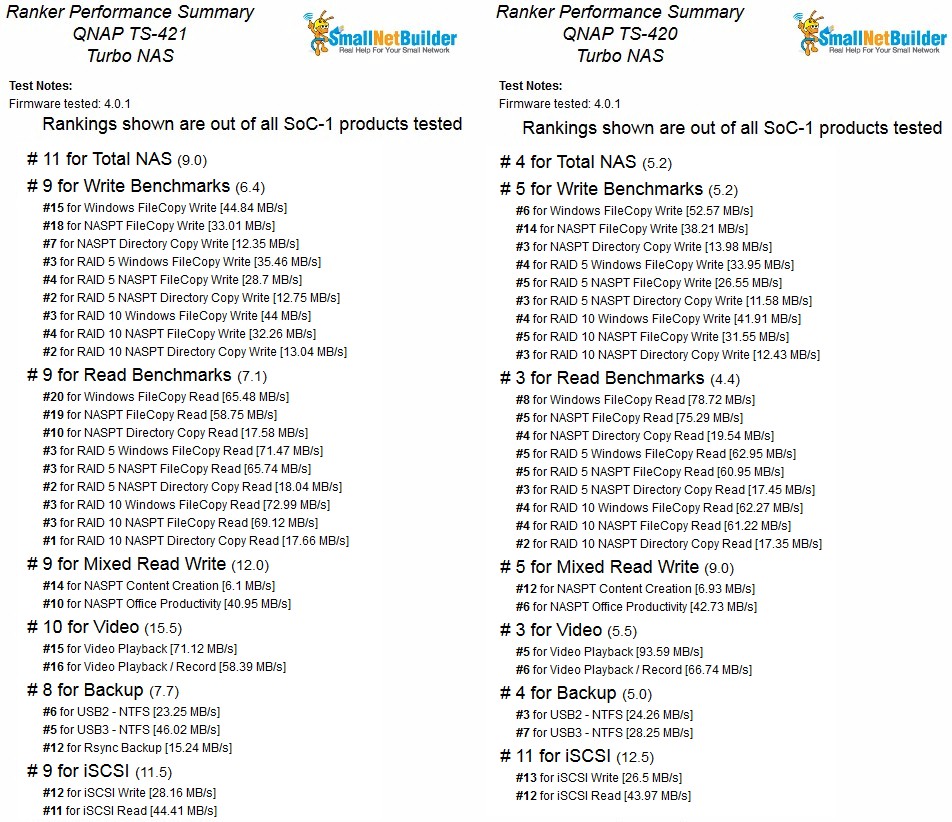
NAS Ranker Performance summary QNAP TS-421 & TS-420
Among all SoC-1 class products, the TS-221 at #7 is right below the TS-220 at #6. Looking at only two-bay NASes, the TS-220 and TS-221 rank at #6 and #5. The differences this time are less striking and amount to small differences in numerous benchmarks that all add up. Again, however, it’s the less expensive and supposedly lower-powered TS-220 that comes out on top.
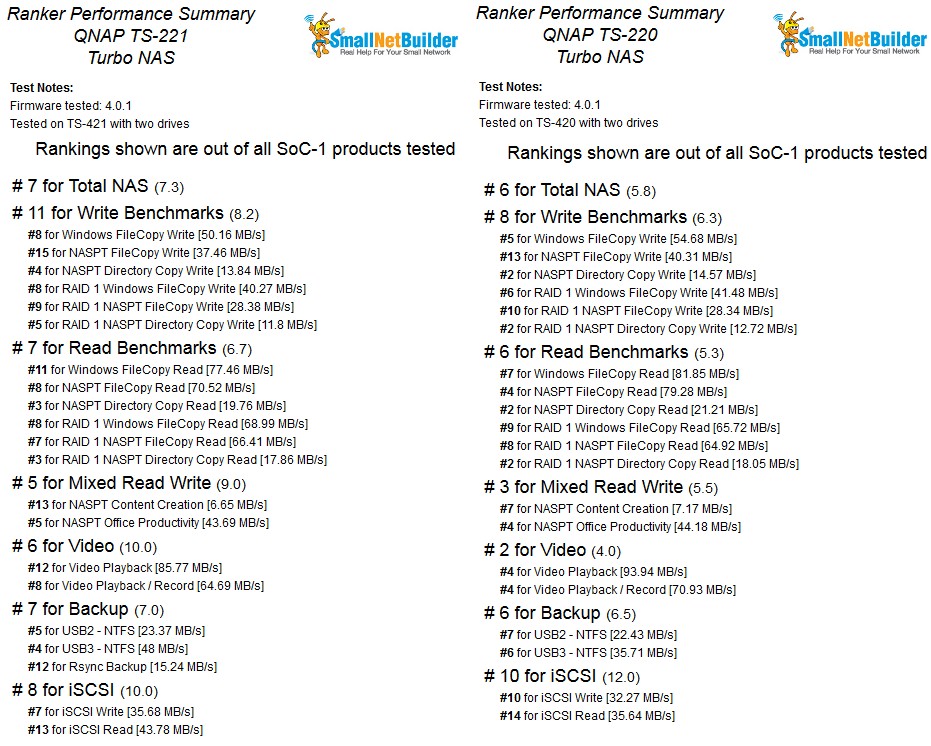
NAS Ranker Performance summary QNAP TS-221 & TS-220
Finally, for single bay SoC-1 class NASes, the TS-121 at #11 (tied with the TS-421) finally outranks its less-expensive TS-120 cousin tied at #14 with the older TS-412. Among only single-bay SoC-1 class products, the TS-121 ranks first, with the TS-120 third-ranked with the older TS-112 between them.
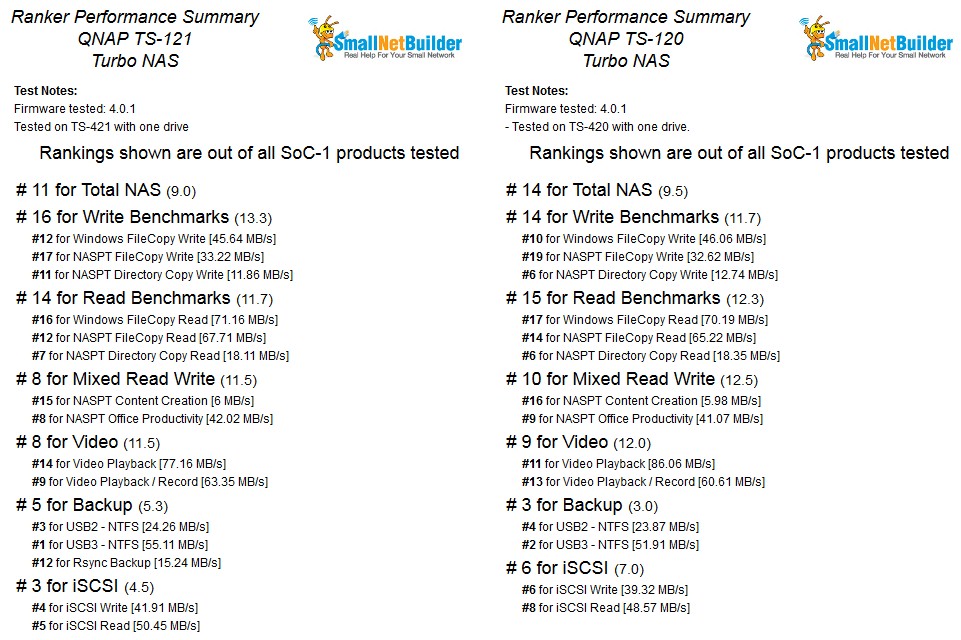
NAS Ranker Performance summary QNAP TS-121 & TS-120
Looking at the Ranker Performance summary comparison above, the difference in ranking again comes down to small differences that all add up. The biggest difference that jumps out at me is the TS-120’s 86 MB/s Video playback vs. the TS-121’s 77 MB/s. Otherwise, these two NASes are about the same as you can get.
Conclusion
This conclusion for the TS-x21 family is the same as I wrote for the TS-x20 family review. QNAP is known for having a lot of NASes to choose from. And in this case, it just seems like too many. By our testing, paying a premium for the TS-x21 series with its slightly higher processor speed and 1 GB vs. 512 MB of RAM just doesn’t seem worth it. The premium you pay depends on how well you shop. But it can be significant in percentage as Table 3 shows.
| TS-x20 | TS-x21 | x21 premium | |
|---|---|---|---|
| One bay | $169 | $220 | 30% |
| Two bay | $219 | $321 | 47% |
| Four bay | $413 | $480 | 16% |
Table 3: The x21 premium
(all prices from Pricegrabber on 7/29/13)
There may be scenarios where paying the premium might be worth it. But if it were our money, we’d opt for the x20 versions and pocket the difference.
